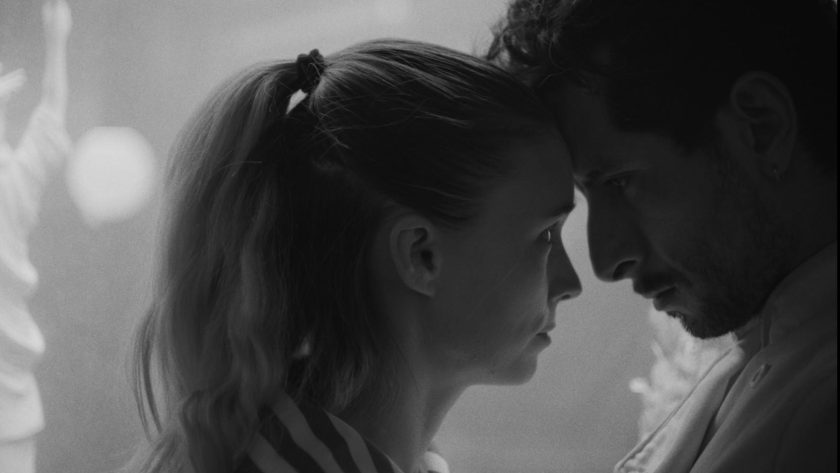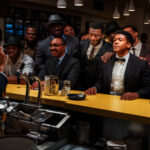The FilmSoc Journal is back for the 74th edition of the Berlinale, with critic Elena Xiang delivering a look at the hits and misses of the upcoming 2024-5 season of cinema.
Elena Xiang reviews Alonso Ruizpalacios’ La Cocina, a formally opulent examination of the chaos that unfolds in the back kitchen of a restaurant in Times Square.
In the winter of 2023, I did a one-day trial shift at a fine dining restaurant near Oxford Street. A clear contrast has persisted in my mind since then: the contrast between a colourful world of maroon curtains, high heels and bubbling champagne, and the back kitchen of steaming dishwashers, narrow cold storage rooms, and forever ongoing mourning of ‘back!’. I never returned to the restaurant. For me, the professional kitchen is a place of black and white. Alonso Ruizpalacios’ La Cocina brings back the exact memory of that day, as the director himself took inspiration from his early experiences working at a London Café when he was a student and visited numerous New York back kitchens to research. This adaptation of Arnold Wesker’s 1959 same-name play resulted in controversial critiques at the 2024 Berlinale, receiving the second-worst Jury grid (1.9) and not a single mention at the award ceremony.
Many criticised its almost abusive overuse of cinematic technique, including a black and white frame (referred to as a ‘suicidal attempt’ by the director himself), a 15-minute-long take capturing more than 20 characters, and dialogue so saturated and compact that it leaves most audiences feeling breathless. It’s noisy, unpleasant, but you can’t say it’s unreal. Is Ruizpalacios’ kitchen really too much of a maximalist cinematic style, or are white critics, making up 9/10 of the Jury grid, simply too privileged to understand the authenticity of its maximalism?
The construction of the kitchen where people come and go is at the core of this film. With the same production designer of The Whale (another famous play adaptation), La Cocina’s kitchen is an immensely expanded stage centred for drama and conflict at the back of ‘The Grill’, a restaurant at Times Square, New York City. We never get a detailed, cohesive overview of the kitchen or entirely have a grasp of what is happening at any given point. It is a place of enigma, a space with endless folds, and it is not only the sense of direction that we are losing but an unshattered conception of individuality that necessarily succumbs to the claustrophobic environment. We see the other side of New York from the beginning when the slow motion camera, reminiscent of Wang Kar-Wai’s Chungking Express, captures a newly arriving young Mexican girl Estella (Anna Diaz), navigating in the jungle of the world’s messiest metropolis, trying to find a job in ‘The Grill’ through her childhood connection, Pedro (Raúl Briones Carmona).
Pedro is a problematic character, arguably a living example of ‘toxic masculinity’ if analysed through the lens of gender studies. Alongside other illegal immigrant workers, the majority of whom are also Mexicans, Pedro is the centre of the kitchen: he is always yelling in Spanish regardless of his recipient, making offensive jokes (no less racist or sexist), or recklessly putting himself into verbal and physical conflict with others. He is three strikes away from getting fired, a fact that seems to not bother him whatsoever. Pedro’s behaviour is a subtle attempt to revolt against a living condition that he is dissatisfied with but has minimal ability to change. As the story continues, he becomes the primary suspect in a $800 theft case (both in the eyes of the manager and that of the audiences), which puts him at risk of deportation and losing everything. He is also incapable of convincing his workplace lover, Julia (Rooney Mara), not to abort their accidental child. Like most illegal workers, he left his hometown in pursuit of the American dream, only to find out he is no more than a victim of cheap labour exploitation and an ignorable gear in the grandiose machine of late-stage capitalism.
When the cherry coke machine in the kitchen breaks down during the busiest lunch hour, the kitchen gradually turns into a dysfunctional mess flooded by this cheap beverage fountain. Ruizpalacios successfully shows the absurdity of a larger, symbolic, and Kafkaesque machine. The scene came from his real-life experience visiting a New York cinema where the cherry coke machine was broken without anyone paying attention or intending to fix it. For him, this is the perfect example of ‘Fucked up capitalism’.
Karl Marx would compliment specifically on how the workers in La Cocina are estranged from the product they produce. Seemingly a film related to food but in the end drastically different from the aesthetic French kitchen in Tran Anh Huang’s The Taste of Things, the food in La Cocina is intentionally made revolting. Estella’s skillful hand used for cooking Michelin-level cuisine in Mexico makes no difference in ‘The Grill, ‘ a place for burgers and french fries. It is not the quality but the speed that matters. La Cocina is not about food but about people’s state of making food – the state of sweating urge, endless orders, and complete chaos. It is no surprise that none of the cooks at La Cocina pay any more than necessary attention to the food when they fight every lunch hour like a war warrior. The only two times Ruizpalacios captures Pedro making actual food with aesthetic camerawork are when he cooks for Julia and later for a homeless person out of his own free will. ‘It is sad’, Ruizpalacios said, ‘Some of them can actually cook nice food; there is just no interest or necessity for it’.
Rooney Mara’s performance is a blessed combination of expressivity and nuance, bringing into life a vivid working-class white American female struggling with her secret personal life. Julia is a character with great complexity on many levels. Her American passport and an undertone of racial superiority put her into an unquestionable position of dominance in her relationship with Pedro. However as a woman, she is rendered the subject of a pregnancy scare. Julia’s agency is rarely interrupted in La Cocina, which culminates in the abortion scene when an ant climbs up her body. From Sex Education to Why Women Kill, abortion clinics are not unfamiliar to contemporary audiences as a private sphere where females share a collective experience of vulnerability, trauma and reclaiming subjectivity through refusing an intrusion towards their bodies.

La Cocina ends in a Ruben Östlund style of madness, an unsolvable confrontation, and resignation. Pedro’s attempt to ruin everything in the kitchen only puts a temporary halt upon the assembly line. He is dragged back to the kitchen very soon after breaking into and making a show in the dining hall, the forbidden area marked by class distinction, showing the instantaneity of his rebellions – an effort to blur the lines between the two contrasting worlds. Pedro couldn’t say a word when the restaurant runner asked him in extreme anger: ‘I gave you a job, I gave you everything. What else do you want? What else do you want me to do?’ Indeed, no one has an answer to the core question. The little benefit squeezed by the system gives most people no incentive to challenge it and renders those who did seem rather ungrateful.
Everyone knows how horrible the system is, but do we really have better options? Pedro’s solo French Revolution is doomed to fail, just as Ruizpalacios attempts to ask a sensitive question pointing at the core of the film industry, a reality no less exposed to the cruelty of class and race than the fictional kitchen. Is film a bridge of building mutual understanding or a barrier? Does transcendental empathy truly exist? As Pedro fades into the shadows of La Cocina, the inquiry lingers, eventually swallowed by the grandeur shadow of the Berlinale Palast.




